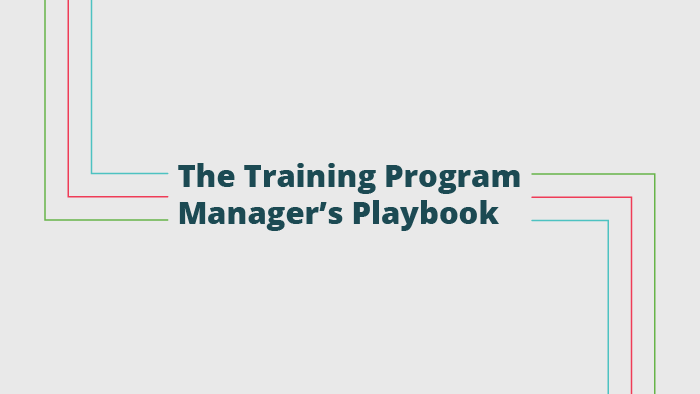Does employee training get all your attention, all day every day? Or is it just one small part of the mountain of responsibilities you manage?
Wherever you fall on the training program manager spectrum, there are particular skills you’ll need to run a program that aligns with business needs and produces results.
Don’t worry, these 10 training skills don’t have to be an inborn talent – they’re areas of focus that can be learned and improved upon. As a program manager, training and development is just as important for you as it is for your learners!
Some of these you may already have down pat, but for the ones that could use some work, make sure to download our Skills Workbook for action steps to improve those areas.
1. Be Invested
The employee training program manager is the impetus for engagement and real change through learning.
You’re carrying the banner for this initiative, showing everyone at every level of the company that training works, and you’re dedicated to building a program that improves employees’ work and overall lives.
If engagement or buy-in are issues, simply showing them you’re invested in training can be the first step toward success.
2. Communicate With the Right People
One of the most important skills as a training manager is the ability to effectively communicate with the right people.
Who are the right people?
Well… everyone!
You’re working with people at all levels of the company, whether it’s getting leadership buy-in or showing employees the benefits they can gain from utilizing the training you’ve worked so hard to offer them.
Alignment is your goal. Get people to unite behind your dedication and vision, and you’ll have a strong foundation for your employee training program.
3. Know Your Company
As a program manager, you have to have a pulse on the company – know its history as well as current affairs.
Understanding business goals and current challenges is essential to determining how a training program can support the company. You’ll also want to stay up to date on what’s in the news, any awards won and big changes within the company or particular departments.
4. Be Curious
Curiosity may be the most difficult of these skills to learn if it isn’t already innate, but the more invested you are in seeing your training program succeed, the more curiosity you’re likely to develop.
Asking questions is key to seeing where improvements and changes need to be made. You can use your people skills to network and ask other training program managers about their experiences, and ways to highlight the importance of training management skills within your organization.
5. Know the Training Industry
Along with having a pulse on your company, you’ll need to follow associations, groups, and publications to keep an eye on the training industry.
This is important to ensure you’re providing the most up-to-date information, resources, and tools to employees – neglecting to watch out for changing trends can end up having a big impact on engagement.
If your employees don’t feel like they’re getting training that is building relevant skills and knowledge, they’ll find other ways to learn (leaving your program in the dust), or they’ll find another company with more promise of growing their career.
6. Communicate
Communication is a skill that everyone can always use improvement in, but when it comes to training people and building an effective program, these are the training manager skills you’ll want to be focusing on:
- Relationships with coworkers
- Reading people
- Proactive composure
- Objective listening
- Written/verbal skills
- Creativity
There are a lot of ways to improve communication skills, so for this one especially we recommend taking a look at the Skills Workbook to learn specific behavior changes that’ll help you become a better communicator.
When it comes to manager skills training, start discussions about how offering resources for leaders to develop these soft skills helps improve efficiency within their teams and drive business goals.
7. Problem Solving Skills
Solving problems is at the core of employee training, so to be effective in your role, you’ll need to develop soft skills to help you come up with solutions to business needs and challenges.
This requires blending the aforementioned skills of curiosity, knowledge of your organization, and knowledge of the training industry – finding a solution typically starts with asking a question, and then doing research to find answers to that question.
8. Leadership
This skill applies wherever you are in the company, whether you’re on the leadership team, managing a department, or specifically in a training specialist role. The title isn’t important here – it’s the actual skill of leadership that’s needed in an employee training program manager.
Program managers are leaders through the support and empowerment of others. High emotional intelligence, among many other skills, is key to understanding how to lead others toward their fullest potential.
Expert-led, cohort-based training, specifically dedicated to developing these type of leadership skills, is a great tool to consider incorporating into your L&D program to upskill leaders in your organization, including yourself.
9. Know Vendors
How much do you know about the vendors who provide technology and content for your training program?
Have they given you a thorough understanding of not only the technical knowledge, but also the features and benefits of using their products?
If not, take the time to reach out and see what you may be under-utilizing. It could end up preventing some big headaches in the future!
10. Form Partnerships
Along the same vein as knowledge of your vendors – how is your relationship with them?
Your vendors should be as dedicated to your training program as you are. This is about developing a relationship where you trust each other to be committed. Vendors are there to help you succeed, if you’re willing to see them as a partner in your training program’s success.
This partnership element is something that’s always been important to us at BizLibrary. We’ve seen time and time again how the clients who leverage our expertise the most are able to build stronger training programs that deliver measurable results and ROI.
That’s why all of our clients have a dedicated Client Success Manager and receive ongoing, strategic support – at no extra cost. On top of that, we host an annual conference where all clients are invited to come learn, share, and connect with other L&D professionals.
That’s how much we believe in partnership.

